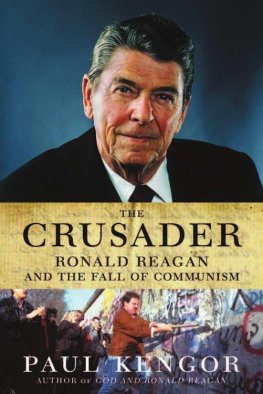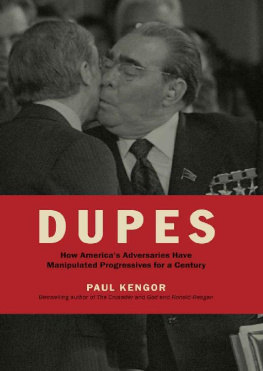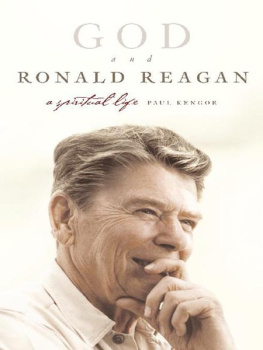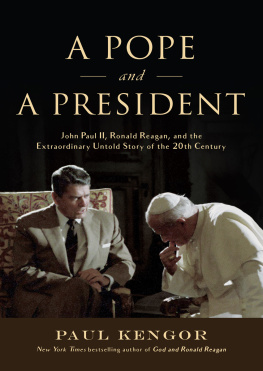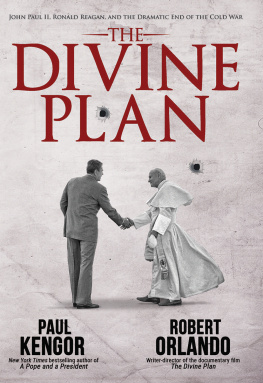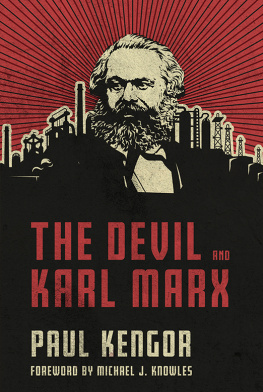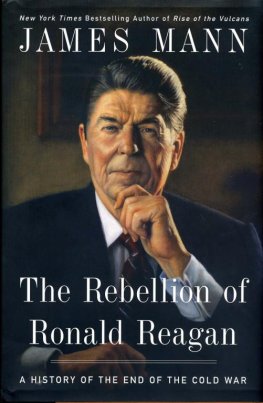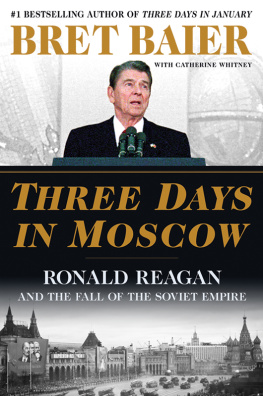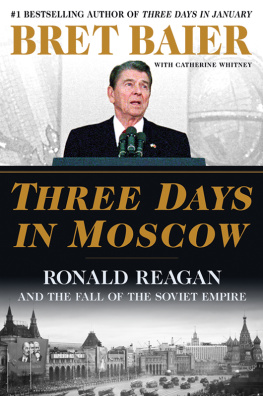Paul Kengor, Ph.D.
THE CRUSADER
Ronald Reagan and the Fall of Communism
To the late B. Kenneth Simon
The U.S. President really does see himself assome kind of latter-day crusader.
YURI KORCHAGIN, UNRESTRAINED, IZVESTIA , JUNE 11, 1982
[T]he crusade declared by U.S. President Reagan is not just talk. It is an action program aimed at rolling back communism. That is, a program of all-around struggle against world socialism.
VADIM ZAGLADIN, THE GREAT TRUTH OF OUR TIME, PRAVDA , JULY 28, 1983
Join me in a new effort, a new crusade.
RONALD REAGAN, FEBRUARY 26, 1982
IT MAY SEEM ODD TO TITLE A BOOK ON RONALD REAGAN AND the Cold War, The Crusader. Some might think the choice sensational, chosen to overdramatize what Reagan believed, or even sarcastic. Yet, the label reflects Reagans mindset and actions, and what the Soviets believed and said about him throughout the 1980s.
The title is instructive: In researching this book, I spent many days reading through Soviet media archives from the 1960s through the 1990sarticles from Pravda, Izvestia, and unmemorable publications. I vetted press releases from TASS, the official Soviet news agency, as well as transcripts of Moscow radio and TV broadcasts. I was surprised to encounter hundreds of examples of Soviet figures referring to Reagans intentions vis- -vis the USSR as a crusade, dubbing him the crusader, and calling his team crusaders. It was not uncommon in Moscow in the 1980s to open the pages of Pravda or Literaturnaya Gazeta and be struck by headlines like Twentieth Century Crusaders or The Washington Crusaders: The Ideological War Declared by Reagan Against Communism and Socialism.1
The Soviets frequently used these words to characterize Reagans assault on their ideology and empire. It was standard fare for someone like commentator Genrikh Borovik to get on Moscow TV and explain that a crusade against us was announced by Reagan.2 When the Soviets used the word, they often employed it within a religious context and with derision. Where did they come up with this colorful language? It was not devised by a Kremlin propagandist. Reagan himself had used it since at least 1950.
Many years later, in his emotional July 17, 1980 presidential nomination speech at the Republican convention, Reagan extemporaneously closed: Ill confess that Ive been a little afraid to suggest what Im going to suggestIm more afraid not to: that we begin our crusade joined together in a moment of silent prayer.3 As president, he frequently exhorted the faithful to join him in a new effort, a new crusade, as he requested in a February 26, 1982 speech at the Conservative Political Action Conference.4 As the Soviets knew, the word did not refer simply to Reagans domestic thinking or political conservatism. He applied it to the great struggle, to the Cold War battle against Communism.
The president took the crusading message abroad, twice urging British audiences to join him. On June 8, 1982 in his Westminster Address in London, where he predicted Marxism-Leninism would be placed on the ash heap of history, Reagan pressed for a crusade for freedoma call that sent the Soviet media into a fury. Returning six years later in a June 1988 speech before Londons Royal Institute of International Affairs, he offered a verse from the Bible (Isaiah 40:31) as the ingredient in his formula for completing our crusade for freedom. [T]hat crusade for freedom, he assured his distinguished audience, that crusade for peace is well underway.5
Of course, the word crusade has a heavy religious connotation. In my work, God and Ronald Reagan: A Spiritual Life, I focused on the mans spiritual pilgrimage, a journey that culminated in his personal crusade to undermine the USSRa peaceful crusade not marked by any hoped for or planned apocalyptic clash. He saw himself as an instrument of God, doing the Almightys will according to what he called Gods Plan. Ronald Reagan believed America was chosen by God to confront the Soviet Communist empire and prevail. As the leader of the United States at a special moment in time, he sensed that God had ordained such a role upon, as he put it, his team.
It was this religious dimension to Reagans Cold War assault that enraged the Kremlin. The officially atheistic Soviet government had long pursued, in Mikhail Gorbachevs words, an open war on religion.6 For Soviet atheists, Reagans talk of a crusade was too much to swallow; it became a source of highest condemnation and scorn. [T]he present White House incumbent, invoking God, [has] declared the crusade against socialism, observed Vitaliy Korionov in an angry Pravda analysis titled, Production Line of Crimes and Hypocrisy.7 Also in Pravda, propagandist Georgi Arbatov was unusually subdued when he raged at Reagan: Frenzied calls are being made for crusades.[This is] outright medievalism. And all this is covered up by hypocritical talk about faith and God, about morality, eternal good and eternal evil.8
To Moscow, Reagans crusade was synonymous with his effort to undermine the Communist empire. The Kremlin understood his intentions completely. The objective of this book is to reveal Reagans intent to undermine and, in the process, illuminate his personal role in this historic effort.
FEW EVENTS IN THE TWENTIETH CENTURY AND AMERICAN history as a whole were as consequential as the end of the Cold War. Vladimir Lenins Bolsheviks seized power in 1917. The Cold War started in the 1940s. By 1989, the Soviet Communist empire was finisheda death that Ronald Reagan had hoped for long before his 198189 presidency. Historian John Lukacs declared that the twentieth century ended in 1989. And so it did.
A professor teaching a course on the twentieth century could tell much of it through Reagans experiencesfrom the seven-year-old boy joining a flag-waving crowd welcoming home doughboys from WWI on the streets of Monmouth, Illinois in 1918, to the influenza epidemic that nearly took his mother in 1919, to the advent of radio, to the Great Depression, to the magic of Hollywoods golden age, to the New Deal and the rise of the federal government, to World War II, and on to the Cold War, Communism, the bomb, the Red Menace, and much, much more, all the way through his presidential races and the Cold War victory. One can trace the birth of the Bolshevik Revolution, six years after Reagans birth, to its collapse when he was near eighty: the start and end of Soviet Communism were the bookends of Ronald Reagans life.
Reagan not only hoped for Communisms demise; he often predicted it. More so, his administration went beyond hoping for the end, and beyond the commander-in-chiefs forecast that Communism would end up on the ash heap of history. The Reagan administration went so far as to design and implement actions, policies, and even formal directives intended to reverse the Soviet empire and win the Cold War. This is not an exaggeration, not a sloppy statement, and the fact itself is historically critically important. And yet, despite all that has been written on Ronald Reagan, questions on the mans personal role in this Cold War strategy remain unanswered.9
Edmund Morris, who more than any outsider had the best opportunity to learn what Reagan knew and did, described in the prologue of Dutch, his official biography of Reagan, how he left the Oval Office one day after interviewing the president and puzzled for the hundredth timeHow much does Dutch really know?10 The New York Times columnist Anthony Lewis, one of many on the political left not respectful of Reagans mind, who usually assumed the worst, said, Theres this mystery to Reagan that pervades everything, which is how much was he aware of what he was doing?11
This book will show that the correct answer, as related to Reagan and the Cold War specifically, was provided by Reagan foreign-policy adviser Richard V. Allen, who said candidly that the key factor in the winning sides team, meaning the United States in winning the Cold War, was the president himself.12 Allens assessment, unlike that of Lewis, had the advantage of proximity. Unlike the pundits, Allen actually interacted with Reagan on a daily basis for years, both before and during the White House period. That was even truer for Judge William P. Bill Clark, former Reagan national security adviser, right-hand man, and close friend. Going further than Allen, Clark has often said that Reagan will be remembered by those of us who worked with him in Sacramento and Washington as being far wiser than his Cabinet and his staff combined.13

